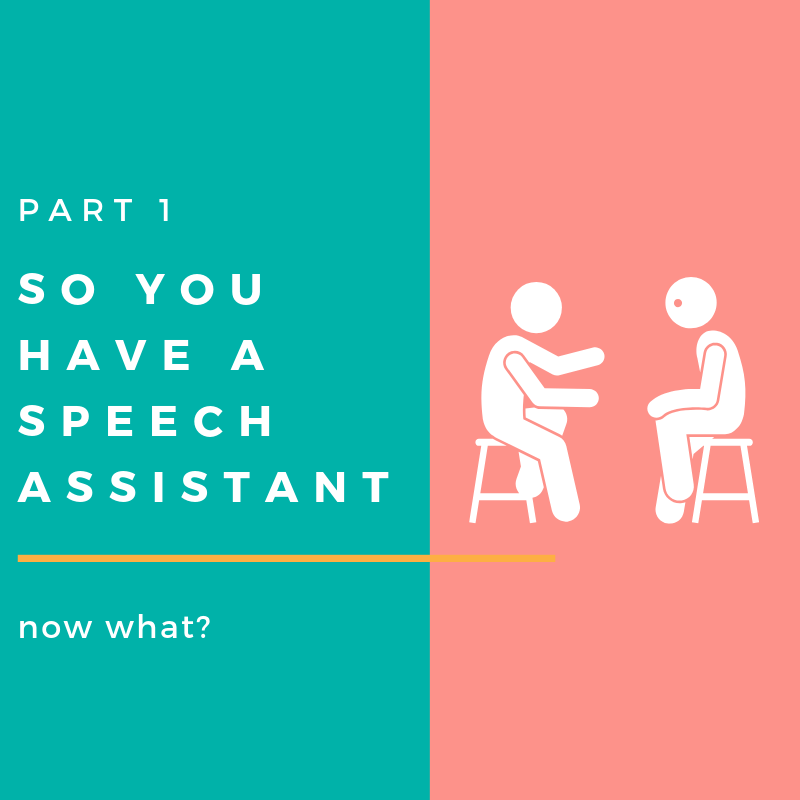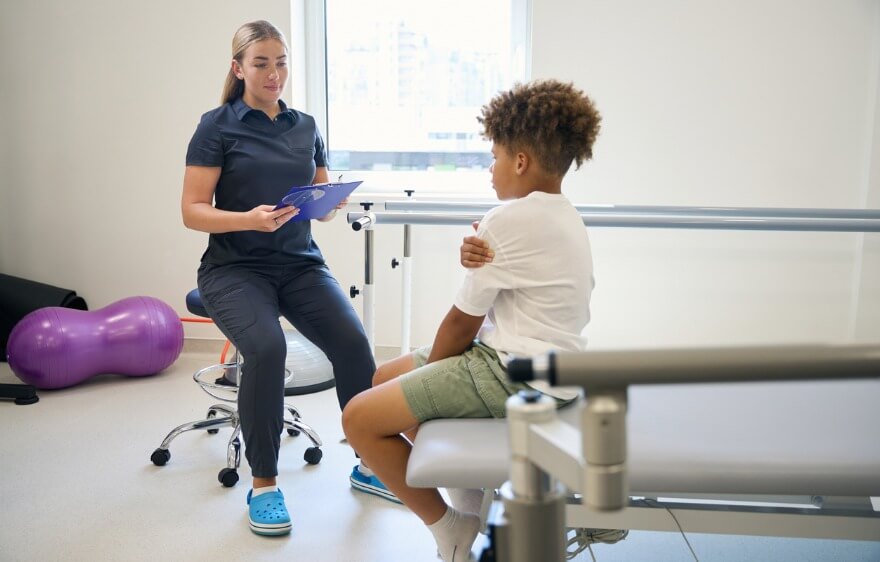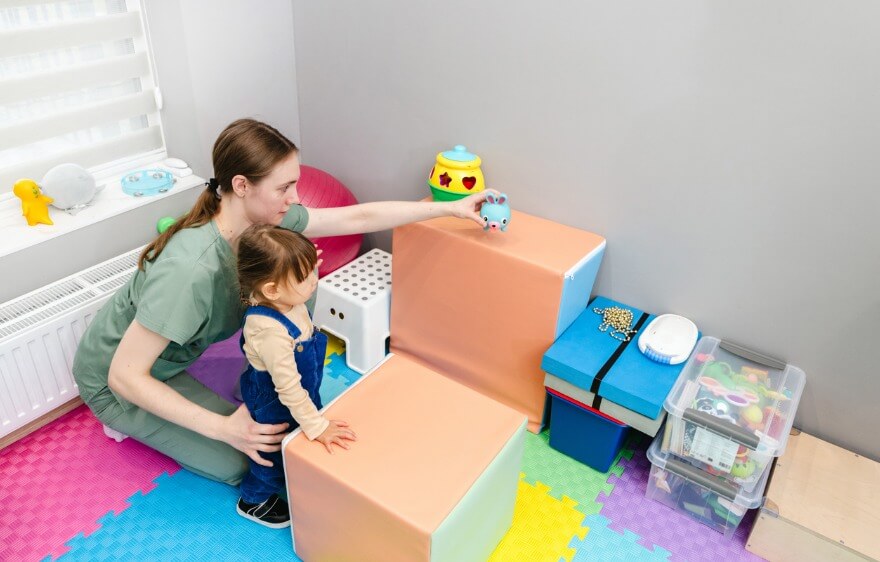Now what, right? If you’ve never worked with a speech assistant, you may be feeling anxious, excited, confused, or downright scared! That’s okay, that means you’re thinking about it. Hopefully, those thoughts are about how to make the relationship between you and your assistant one that will foster trust, honesty, flexibility, and, if not a true desire to work together, at least not loathing being near them.
I have some experience and insight to working with Speech Aides/SLPAs. In my almost 12 years as an SLP, I’ve supervised at least 14 different people in 5 different states – Alaska, Montana, Oregon, Washington, & Wyoming. In general, I love working with assistants! I think the root of that is that I love my job. I love being a Speech Language Pathologist. If I can pass on my love for all things speech to others, I’m happy.

So how do you train a good assistant and have a good relationship with them?
That’s what this blog series will be about. I look forward to sharing my experiences of working with and training people, from those that may be stepping into a speech therapy room for the first time to those with years of experience. No matter how much experience my assistant has, we always learn a lot from each other and I’ve kept in contact with almost every assistant I’ve worked with. I hope that by reading my posts, you may be inspired to supervise an assistant (formally trained or not), may implement some of the things that I’ve tried, or may even offer me some tips. The key is that we’re learning. Not one of us is going to do things correctly every time. Let’s learn from each other.
Before we get started on how to make a great assistant, though, let’s clarify some . . .
Terms
To hopefully avoid confusion, I want to point out that in the speech world, there is a difference between Speech Aide and SLPA.
- A Speech Aide (aka ‘Speech Assistant’) does not have any formal training, and in some states, can literally walk in off the street and get the job if the district hires them. This person may have years of training and experience with students, may be brand new, or may be somewhere in between.
- An SLPA (Speech Language Pathology Assistant) is a person that has their certification or licensure as an SLPA after completing an Associate’s or Bachelor’s in Speech/Language Disorders or something similar, depending on the school they attend. They are not a Speech Language Pathologist and do not have a Master’s degree.
ASHA’s definitions of the above terms can be found here.
Both titles imply assisting an SLP. Depending on the state, allowable duties and supervision requirements may differ. For blog purposes, I’ll try to remember the distinction, but I’m human so please forgive me. If I write “assistant,” I am generally referring to both.
Why Do We Have Both?
If you’re an SLP reading this, you are aware of the huge shortage of SLPs. Many states have taken to hiring assistants for SLPs to ease workload demands, reach rural areas, work with students that speak a different language than the SLP, and several other reasons. But guess what? There’s also a huge shortage of SLPAs. So when we look at what each state requires to work as an assistant to an SLP, the laws vary about who can fill that role. Unfortunately, this also leaves a lot of gray area for supervision requirements, especially when not every state requires assistants to register, or like Washington and several other states, aren’t even regulated in schools. You can find links to ASHA’s state requirements here, and their position statement on SLPAs here.
In my personal experience, it hasn’t really mattered whether I’m working with an SLPA or a Speech Aide.
WHAT?
Seriously. To me, it hasn’t mattered. Perhaps this is because I’ve worked with far more untrained people than trained. Of those I listed above, only 4 were SLPAs and a couple more were in the middle of taking “speech classes.” Luckily, most of these people were great to work with and easy to supervise. A few, however, certainly didn’t belong in the job they’d been hired for and, I am happy to report, realized this and have moved on to careers more suitable to their personalities. But when you get the chance to work with someone that is eager to learn and there for the kids, rather than someone that thinks they already know it all or is just looking for a paycheck, you’ve got yourself the beginnings of a great assistant.
Starting Off on the Right Foot
If you have the chance to be part of the interview process for hiring assistants, especially your own assistant, jump on that opportunity. Don’t leave it to admin if you have the chance to help make the decision. Someone may look amazing on their resume but not be the best person for the job. Ultimately, you’re the one that will be working with them, so get involved from the beginning if you can. Be sure to ask questions related to the actual speech work, but don’t get turned off if they don’t know the answers. Pay more attention to how they’ve handled conflicts with others, how they speak and articulate, and why they want this job. Hopefully they are wanting to help kids. Can they give you examples of their flexibility? Have they worked with kids before? Have they been supervised before? What did they like or not like about being supervised?
Unfortunately, we don’t always have a choice about who we work with and often administrators are left scrambling to fill the position. Sometimes, only one person applies, only one has the essential skills required (like a second language), or perhaps you’re in a state where the person filling the position must be an SLPA and applicants are limited. If that happens and you’re left working with a less than ideal assistant, don’t lose hope — pull out all of your tricks and get working!
Whether they’ve had previous training or not, I go in assuming that I’m training from scratch. Often those with experience are proud to demonstrate what they know, while others may be hesitant about a new supervisor, especially if they have a history of working with a less-than-ideal SLP. My job, our job, as supervisors and SLPs, is to guide and provide constructive feedback to effect change.
Years ago, I worked with an assistant who continually referred to me as her boss. I repeatedly stressed that I was not her boss, I was her supervisor. I did not have the ability to hire or fire her. I had the ability to guide her. You may have noticed that I say “work with” when speaking about assistants. This is not by accident – we have to work together to make it work. I want assistants that I work with to want my guidance because they trust my judgment, trust that I’ll support them, trust that there will be more good days than bad, trust that we’ll have fun along the way, and trust that we’re putting the kids first in all that we do. So even if you’re having a bad day, feeling snippy, grumpy, or fed-up, don’t take it out on your assistant (or the kids). Don’t be bossy. Remember that you are that person’s rock when they come to work, and while they are there to support you in getting your job done, they also need your support. Be there for them.
Thanks for checking this out! Look for future blog posts from me about how I train assistants, what I do to inspire them, and a few tales of not-so-great assistant moments.
I’d love to know what sorts of topics are of interest to those of you who are working with or are curious about working with assistants. Please leave a comment for us on Facebook, Twitter, or Instagram and I’ll do my best to answer any questions I get!





